壮族英文介绍
- 格式:ppt
- 大小:3.08 MB
- 文档页数:2
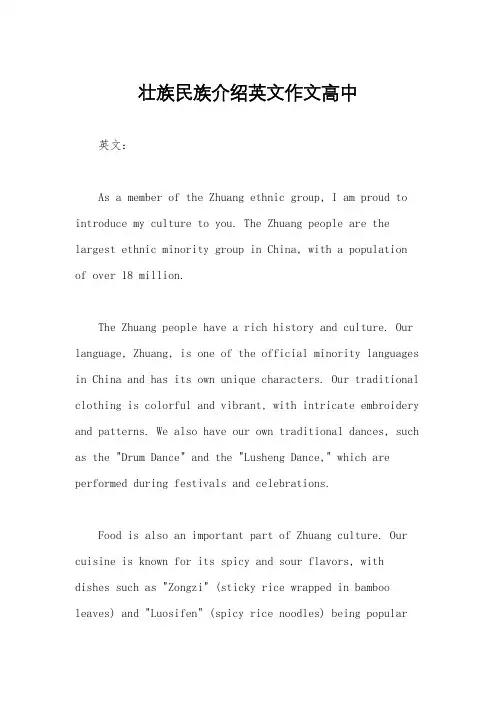
壮族民族介绍英文作文高中英文:As a member of the Zhuang ethnic group, I am proud to introduce my culture to you. The Zhuang people are the largest ethnic minority group in China, with a population of over 18 million.The Zhuang people have a rich history and culture. Our language, Zhuang, is one of the official minority languages in China and has its own unique characters. Our traditional clothing is colorful and vibrant, with intricate embroidery and patterns. We also have our own traditional dances, such as the "Drum Dance" and the "Lusheng Dance," which are performed during festivals and celebrations.Food is also an important part of Zhuang culture. Our cuisine is known for its spicy and sour flavors, with dishes such as "Zongzi" (sticky rice wrapped in bamboo leaves) and "Luosifen" (spicy rice noodles) being popularamong both Zhuang people and visitors.In terms of religion, the Zhuang people have a mix of beliefs, including animism, Taoism, and Buddhism. We also have our own unique festivals, such as the "San Yue San" festival, which celebrates the arrival of spring.Overall, the Zhuang people have a rich and diverse culture that is worth exploring and learning about.中文:作为壮族人,我很自豪地向你介绍我的文化。
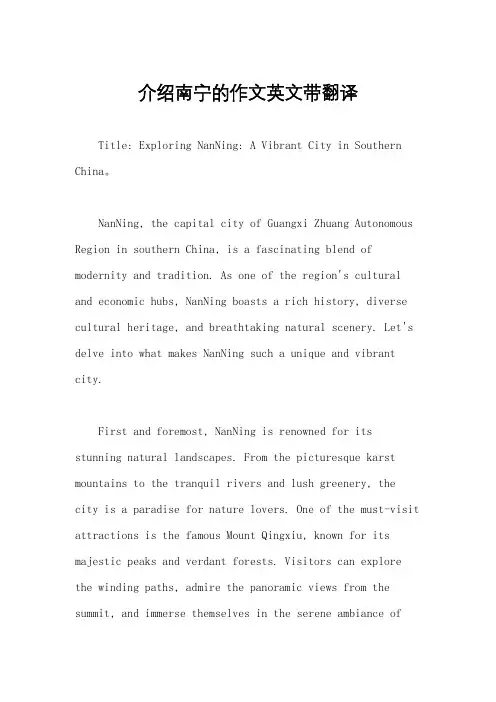
介绍南宁的作文英文带翻译Title: Exploring NanNing: A Vibrant City in Southern China。
NanNing, the capital city of Guangxi Zhuang Autonomous Region in southern China, is a fascinating blend of modernity and tradition. As one of the region's cultural and economic hubs, NanNing boasts a rich history, diverse cultural heritage, and breathtaking natural scenery. Let's delve into what makes NanNing such a unique and vibrant city.First and foremost, NanNing is renowned for its stunning natural landscapes. From the picturesque karst mountains to the tranquil rivers and lush greenery, thecity is a paradise for nature lovers. One of the must-visit attractions is the famous Mount Qingxiu, known for its majestic peaks and verdant forests. Visitors can explore the winding paths, admire the panoramic views from the summit, and immerse themselves in the serene ambiance ofthis natural wonder.In addition to its natural beauty, NanNing is also a melting pot of diverse cultures. As the capital of the Guangxi Zhuang Autonomous Region, the city is home to a significant population of ethnic minorities, including the Zhuang, Miao, Dong, and Yao peoples. This culturaldiversity is reflected in NanNing's vibrant festivals, colorful traditional attire, and delectable cuisine. Visitors can sample local delicacies such as Luosifen (snail rice noodles), Mifen (rice noodles), and various exotic fruits at bustling markets and street stalls.Moreover, NanNing is steeped in history, with numerous historical and cultural landmarks scattered throughout the city. One such landmark is the Yongjiang River, which has played a crucial role in NanNing's development as a trading center over the centuries. Strolling along the riverbanks, visitors can admire the ancient city walls, stone bridges, and traditional architecture that harken back to NanNing's storied past.For those interested in modern amenities and entertainment, NanNing offers a plethora of options. Thecity boasts modern shopping malls, vibrant nightlife districts, and cultural institutions such as museums and theaters. Visitors can shop for souvenirs at the bustling Chaoyang Road pedestrian street, catch a performance at the NanNing Grand Theater, or simply soak in the lively atmosphere of the city's bustling squares and parks.In conclusion, NanNing is a city that truly has something for everyone. Whether you're a nature enthusiast, a history buff, or simply looking to immerse yourself in a vibrant cultural experience, NanNing has it all. With its stunning natural landscapes, rich cultural heritage, and modern amenities, NanNing is a destination not to be missed.南宁,中国南部广西壮族自治区的首府,是现代与传统相融合的迷人之地。
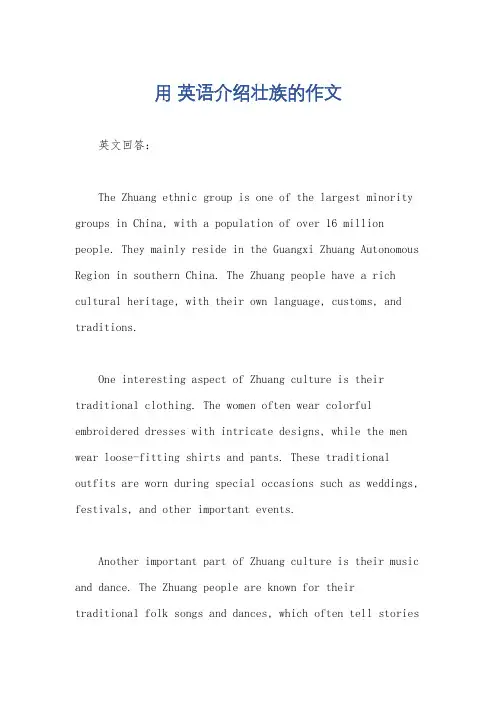
用英语介绍壮族的作文英文回答:The Zhuang ethnic group is one of the largest minority groups in China, with a population of over 16 million people. They mainly reside in the Guangxi Zhuang Autonomous Region in southern China. The Zhuang people have a rich cultural heritage, with their own language, customs, and traditions.One interesting aspect of Zhuang culture is their traditional clothing. The women often wear colorful embroidered dresses with intricate designs, while the men wear loose-fitting shirts and pants. These traditional outfits are worn during special occasions such as weddings, festivals, and other important events.Another important part of Zhuang culture is their music and dance. The Zhuang people are known for theirtraditional folk songs and dances, which often tell storiesof their history and daily life. One popular dance is the "Lusheng Dance," where dancers hold a bamboo reedinstrument called a lusheng and move to the rhythm of the music.In addition to their rich cultural heritage, the Zhuang people are also known for their delicious cuisine. One famous dish is "Luosifen," a spicy noodle soup made withrice noodles, pickled bamboo shoots, peanuts, and chili peppers. It is a popular street food in Guangxi and is enjoyed by locals and visitors alike.Overall, the Zhuang ethnic group is a vibrant and diverse community with a strong sense of identity and pride in their culture. They continue to preserve theirtraditions and pass them down to future generations, ensuring that their heritage remains alive and thriving.中文回答:壮族是中国最大的少数民族之一,人口超过1600万人。
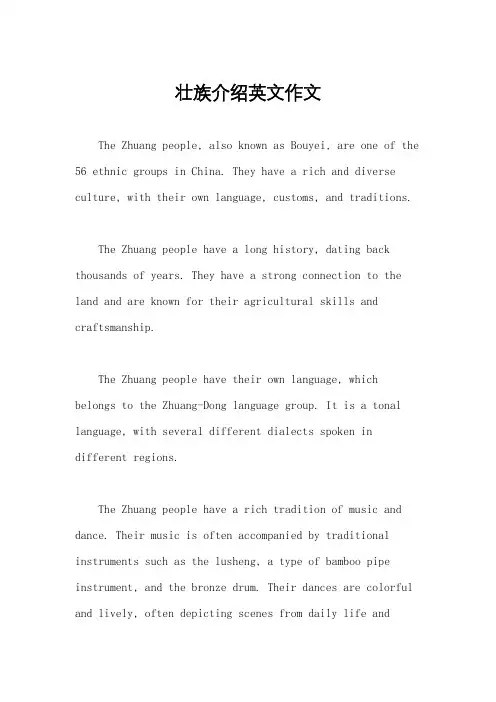
壮族介绍英文作文The Zhuang people, also known as Bouyei, are one of the 56 ethnic groups in China. They have a rich and diverse culture, with their own language, customs, and traditions.The Zhuang people have a long history, dating back thousands of years. They have a strong connection to the land and are known for their agricultural skills and craftsmanship.The Zhuang people have their own language, which belongs to the Zhuang-Dong language group. It is a tonal language, with several different dialects spoken in different regions.The Zhuang people have a rich tradition of music and dance. Their music is often accompanied by traditional instruments such as the lusheng, a type of bamboo pipe instrument, and the bronze drum. Their dances are colorful and lively, often depicting scenes from daily life andnature.The Zhuang people have a unique cuisine, with dishes that reflect their agricultural heritage. They are knownfor their love of sour and spicy flavors, and their dishes often feature ingredients such as rice, fish, and vegetables.The Zhuang people have a strong sense of community and place a high value on family and social harmony. They have their own traditional festivals and rituals, which are important occasions for bringing people together and celebrating their culture.The Zhuang people have a long history of craftsmanship, with skills passed down through generations. They are known for their intricate embroidery, silverwork, and batik, a traditional dyeing technique.The Zhuang people have a strong connection to nature and the environment. They have a deep respect for the land and its resources, and many of their traditions and customsare centered around their relationship with the natural world.Overall, the Zhuang people have a rich and vibrant culture, with a strong sense of identity and tradition. They continue to preserve and celebrate their heritage, while also adapting to the modern world.。
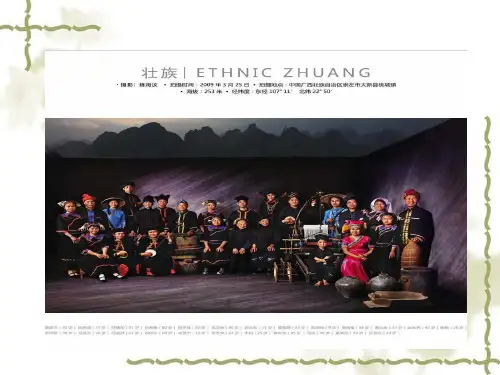
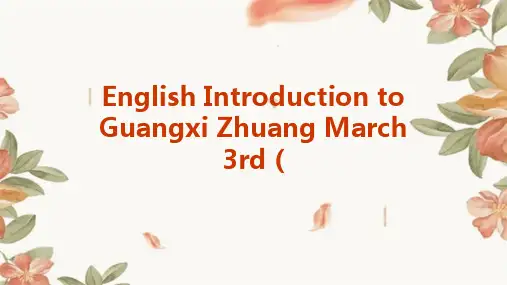
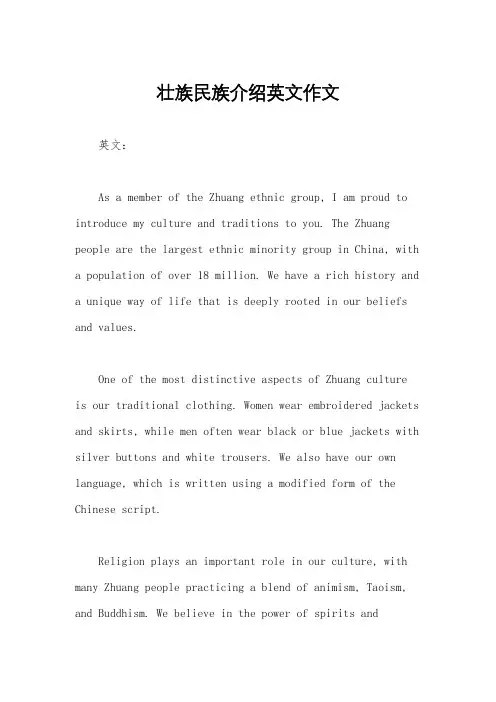
壮族民族介绍英文作文英文:As a member of the Zhuang ethnic group, I am proud to introduce my culture and traditions to you. The Zhuang people are the largest ethnic minority group in China, with a population of over 18 million. We have a rich history and a unique way of life that is deeply rooted in our beliefs and values.One of the most distinctive aspects of Zhuang culture is our traditional clothing. Women wear embroidered jackets and skirts, while men often wear black or blue jackets with silver buttons and white trousers. We also have our own language, which is written using a modified form of the Chinese script.Religion plays an important role in our culture, with many Zhuang people practicing a blend of animism, Taoism, and Buddhism. We believe in the power of spirits andancestors, and often hold ceremonies to honor them.Food is also an integral part of Zhuang culture. We have many delicious dishes, such as sour fish soup, bamboo rice, and spicy chicken. Our cuisine is known for its bold flavors and use of local ingredients.Despite facing challenges and discrimination in the past, the Zhuang people have preserved our culture and traditions. Today, we continue to celebrate our heritage through festivals, music, and dance.中文:作为壮族人,我很自豪地向你介绍我们的文化和传统。
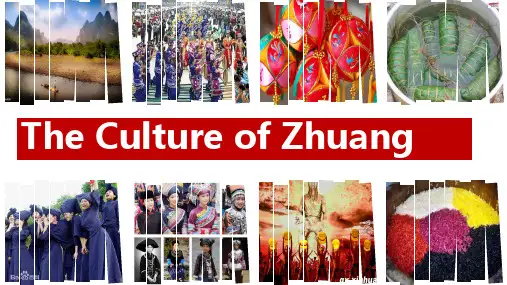

壮族民族介绍英文作文英文,As a member of the Zhuang ethnic group, I am proud to introduce my culture and traditions to you. The Zhuang people are the largest minority group in China, with a population of over 18 million. We mainly live in the Guangxi Zhuang Autonomous Region, but can also be found in other parts of China and Southeast Asia.Our language, Zhuang, is a tonal language and has its own unique writing system. It is a part of the Tai-Kadai language family and has many dialects. Despite being a minority language, it has a rich literary tradition, with many poems, songs, and stories passed down through generations.One of the most important festivals in our culture is the "Sanyuesan" Festival, which falls on the third day of the third lunar month. It is a celebration of love and courtship, where young people dress up in traditional costumes and participate in various activities, such assinging, dancing, and playing games.We also have a strong tradition of folk arts, such as embroidery, batik, and paper-cutting. These art forms not only serve as a means of artistic expression but also reflect our way of life and beliefs.中文,作为壮族人的一员,我很自豪能向您介绍我们的文化和传统。
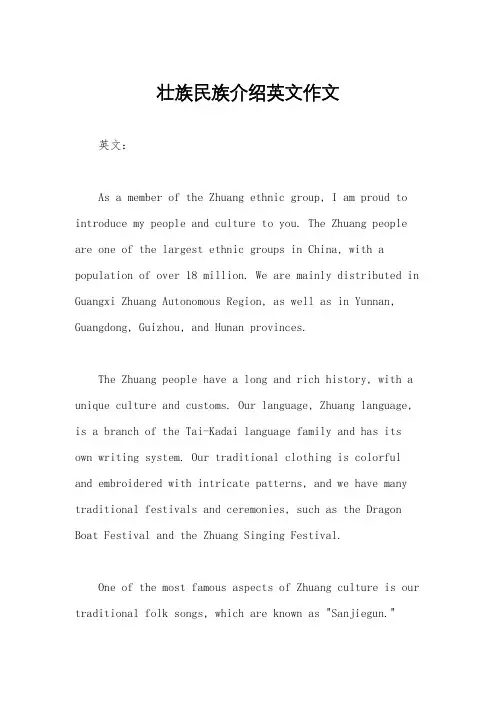
壮族民族介绍英文作文英文:As a member of the Zhuang ethnic group, I am proud to introduce my people and culture to you. The Zhuang people are one of the largest ethnic groups in China, with a population of over 18 million. We are mainly distributed in Guangxi Zhuang Autonomous Region, as well as in Yunnan, Guangdong, Guizhou, and Hunan provinces.The Zhuang people have a long and rich history, with a unique culture and customs. Our language, Zhuang language, is a branch of the Tai-Kadai language family and has its own writing system. Our traditional clothing is colorful and embroidered with intricate patterns, and we have many traditional festivals and ceremonies, such as the Dragon Boat Festival and the Zhuang Singing Festival.One of the most famous aspects of Zhuang culture is our traditional folk songs, which are known as "Sanjiegun."These songs are sung in three parts, with each part representing a different character or emotion. They areoften performed during festivals and celebrations, and have been recognized as a masterpiece of oral and intangible cultural heritage by UNESCO.As a Zhuang person, I am proud of my heritage and culture, and I am always happy to share it with others. Through sharing our traditions and customs, we can promote understanding and appreciation of the diversity of human cultures.中文:作为壮族人的一员,我很自豪地向大家介绍我们的民族和文化。

关于介绍南宁的英文作文英文:Nanning is the capital city of Guangxi Zhuang Autonomous Region. It is a beautiful city with a rich history and culture. There are many things to see and do in Nanning.Firstly, you can visit the Guangxi Museum. It is a great place to learn about the history and culture of Guangxi. You can see many artifacts and exhibits that tell the story of this region. It is a great way to spend an afternoon.Secondly, you should visit the People's Park. It is a beautiful park with many trees, flowers, and ponds. You can take a stroll through the park and enjoy the peaceful atmosphere. There are also many activities to do in the park, such as boating and playing games.Lastly, you should try the local food. Nanning is famous for its delicious food, such as Guilin rice noodles and spicy fish. You can find many local restaurants and street vendors that sell these dishes. They are definitely worth trying.Overall, Nanning is a great city to visit. It has a lot to offer, from its history and culture to its beautiful parks and delicious food.中文:南宁是广西壮族自治区的首府。
壮族英文作文范文Title: The Splendor of Zhuang Ethnic Culture。
The Zhuang ethnic minority, one of the largest minority groups in China, boasts a rich cultural heritage that spans centuries. From their vibrant festivals to theirdistinctive customs and traditions, the Zhuang people have contributed significantly to the tapestry of Chinese culture. In this essay, we will delve into the essence of Zhuang culture, exploring its unique facets and celebrating its enduring beauty.First and foremost, the Zhuang people are known fortheir colorful festivals, which serve as a testament totheir deep-rooted traditions and values. Among these, the "San Yue San" festival stands out as one of the most significant. Held on the third day of the third lunar month, this lively celebration features traditional dances, folk songs, and delicious cuisine. It serves as a time for the Zhuang community to come together, honor their ancestors,and reaffirm their cultural identity.Another hallmark of Zhuang culture is its distinctive cuisine, which reflects the region's abundant natural resources and agricultural heritage. Staples such as rice, corn, and various herbs and spices are expertly combined to create flavorful dishes that tantalize the taste buds. From the fragrant aroma of bamboo rice to the spicy kick of sour fish soup, Zhuang cuisine offers a culinary experience like no other.In addition to their festivals and cuisine, the Zhuang people are renowned for their exquisite traditional clothing. Intricately embroidered with vibrant patterns and symbols, these garments serve as a visual expression of Zhuang identity and pride. Whether worn during festive occasions or as part of daily attire, traditional Zhuang clothing reflects the community's deep connection to its cultural heritage.Moreover, music and dance play a central role in Zhuang culture, serving as a means of storytelling and celebration.Traditional instruments such as the lusheng, a type of bamboo pipe, and the bronze drum are used to accompanylively dances that depict ancient legends and myths. Through music and dance, the Zhuang people pass down their history and traditions from one generation to the next, ensuring that their cultural legacy endures.Beyond its tangible manifestations, Zhuang culture embodies a profound reverence for nature and the spiritual world. The Zhuang people believe in the importance ofliving in harmony with the natural environment, respecting the land and its resources. This ecological wisdom is reflected in their agricultural practices, folk beliefs,and spiritual rituals, which seek to maintain balance and equilibrium in the universe.In conclusion, the Zhuang ethnic minority occupies a special place in the mosaic of Chinese culture, with its vibrant festivals, flavorful cuisine, intricate clothing, captivating music, and profound spiritual beliefs. Through the preservation and celebration of their cultural heritage, the Zhuang people continue to enrich the cultural tapestryof China and inspire admiration and appreciation from people around the world. As we look to the future, may the splendor of Zhuang culture shine brightly for generations to come.。
壮族英文作文范文英文:As a member of the Zhuang ethnic group, I am proud of my cultural heritage. The Zhuang people have a rich history and unique customs that have been passed down through generations.One of the most distinctive aspects of Zhuang culture is our traditional clothing. The women wear beautiful embroidered jackets and long skirts, while the men wear black jackets with silver buttons and wide pants. These outfits are not only aesthetically pleasing but alsoreflect our values and beliefs.Another important aspect of Zhuang culture is our love for music and dance. The "Gong and Drum" dance is a popular traditional dance that features the use of gongs and drums. It is usually performed during festivals and celebrations.In addition, the Zhuang people have a strong sense of community and hospitality. We believe in treating guests with respect and generosity, and often invite them to share meals and participate in cultural activities.Overall, being a member of the Zhuang ethnic group has taught me the importance of preserving and celebrating our cultural heritage. It is a source of pride and identity for me and my community.中文:作为壮族的一员,我为自己的文化遗产感到自豪。